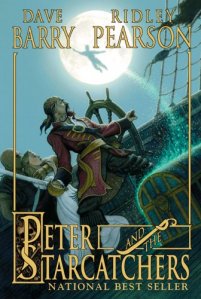 As two ships leave port, the prologue to one of the most famous children’s stories of all time begins, innocuously. Aboard one ship: the greatest treasure known to man. Aboard the other, a group of orphans being sent overseas to the court of a mad king, as well as a secretive young woman and her matronly escort. The first ship, the Wasp, is a beautiful thing, fastest ship around, a prize for any man to covet. The second, the Never Land, is little more than a floating wreck, served by a gibbering idiot for a captain, and an incompetent, careless crew. Enter a third ship: The Sea Devil, feared vessel of the dread pirate, Black Stache, who seeks the Wasp for his own selfish reasons. And so the stage is set for the first act of Dave Barry and Ridley Pearson’s thrilling new story, Peter and the Starcatchers.
As two ships leave port, the prologue to one of the most famous children’s stories of all time begins, innocuously. Aboard one ship: the greatest treasure known to man. Aboard the other, a group of orphans being sent overseas to the court of a mad king, as well as a secretive young woman and her matronly escort. The first ship, the Wasp, is a beautiful thing, fastest ship around, a prize for any man to covet. The second, the Never Land, is little more than a floating wreck, served by a gibbering idiot for a captain, and an incompetent, careless crew. Enter a third ship: The Sea Devil, feared vessel of the dread pirate, Black Stache, who seeks the Wasp for his own selfish reasons. And so the stage is set for the first act of Dave Barry and Ridley Pearson’s thrilling new story, Peter and the Starcatchers.
Naval battles, desperate gambles, surprising turns of event, shocking revelations, and shipwrecks soon follow, leaving the group of orphans, led by the fearless Peter, and their friends, stranded on an island in the middle of nowhere. Peter and his boys, their sailor ally Alf, and the young woman called Molly Aster, are stuck in the middle of a four-way struggle to control the greatest treasure in the world, a trunk full of the mythical starstuff, which can grant powers greater than any mortal should possess. The Starcatchers want to keep the starstuff safe. Black Stache and his first mate, Smee, have their own ideas in mind. The malevolent Mister Slank and his own right-hand-man, Little Richard, likewise have plans. The mermaids (yes, mermaids!) worship the trunk as a god, and finally, the natives of the island want everyone gone … preferably fed to their terrible crocodile, Mister Grin. It’s all here: the pirates, the “Indians”, the crocodile, the mermaids, the fairy, a flying boy named Peter, and of course, a fearsome pirate captain.
In telling the origin story of Peter Pan, Barry and Ridley have reinvented him, stripping away the nonessential aspects and getting back to the core of J.M. Barrie’s original, somewhat darker, tale, while at the same time adding new elements that link Peter to a much larger story. They’ve taken away none of the excitement, adventure, or thrilling escapades, and this Peter, though mortal, is still recognizable as the Peter Pan we’ve all grown up with. Some might find the concept of the starstuff and the Starcatchers, and how it ties Peter in with other stories, other myths, a bit much; I say it sets things up very nice for either a spinoff, or further tales that aren’t overly reliant on the original text. In the end, what matters is that Barry and Ridley have produced a worthy addition to the Peter Pan mythos, one which respects where it came from, yet isn’t afraid to get creative. (For audiophiles, let me note that the audio version of this book is read by Jim Dale, who’s also done the Harry Potter books to date.)
